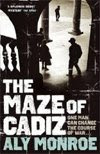Last Sunday we celebrated my mother’s 90th birthday. Given the weather in the UK, this turned out to be rather brave. We had to get from Edinburgh to Guildford – and then back. We were luckyish – some slight delays, walks in minus 8 temperatures due to lack of taxis. But our trains there and back were among the few not cancelled.
My brother and his partner tried to get the 20.30 Eurostar back to Paris on Sunday. They arrived at mid-day on Monday. On our way to King’s Cross we saw the queue waiting to get into St Pancras. From families with young children to elderly people, several thousand were being made to wait outside in sub-zero temperatures.
At King’s Cross we were frequently informed the weather was ‘inclement’ and that everything was being done for our ‘security and comfort.’ The ‘comfort’ part was notional. King’s Cross has been a very small station for generations – doubtless all this will change when the building work is finished.
The ‘security’ part was more obvious. The unfortunate police were out in force at St Pancras and they were keeping an eye on King’s Cross as well. My brother says potential passengers were each given a bottle of water and ‘a bag of chips’ at about 5.30 in the morning after the police had been called in and someone arrested and restrained for protesting at the lack of information and the order that everyone go out and through security again after someone else had left the building, apparently for a cigarette.
From Guildford the London train goes to Waterloo, named after a famous battle. The Duke of Wellington is supposed to have attributed his success to a lack of rigid planning or, more accurately, to tying a knot in a rope when it broke.
My suspicion (I am being nice) is that companies no longer do knots but summon the police, instead. Perfect storm patrol? I would hope the rail companies are charged for this service but suspect they simply add it on to fares. there is no Plan B. As they say at King's Cross, platform zero is to the left of platform one
I was also reminded of John Buchan’s career, based on cracks in the thin veneer of civilization. If Richard Hannay had tried to get a train on Monday 20th December 2010, he’d definitely have died.













